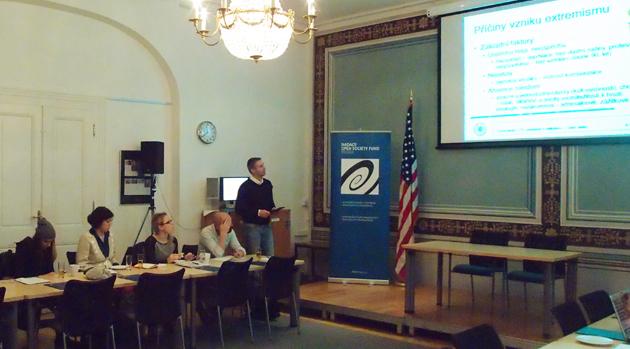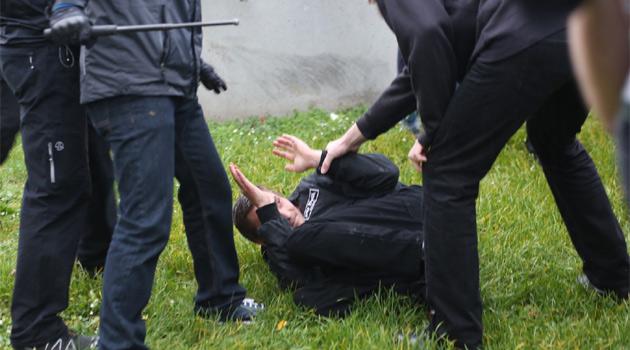Czech Police expert disagrees that Roma should stay away from anti-Romani demonstrations

Last week a round table was held on the issue of violent hate crimes at the American Center in Prague. The gathering was held by Open Society Fund Prague for representatives of nonprofit organizations and the state administration, and its aim was to reflect on the recent anti-Romani marches and the anti-Romani atmosphere in Czech society.
Time was also spent discussing examples of successful projects. During the round table, Zdeněk Ryšavý, director of the ROMEA organization, gave a presentation to those in attendance.
Ryšavý spoke about ROMEA’s project on "Securing balanced news reporting from anti-Romani events" and presented its findings. "The media often reports on anti-Romani events very superficially. They are only interested in situations of conflict, not in what Romani people experience when they become the target of a hate march. We do our best to contribute high-quality, verified information through our reporting and to share it with large media outlets so their readers will get a comprehensive picture of what is happening at any given moment," Ryšavý said.
Representatives of other nonprofit organizations also made presentations at the meeting, including the groups Educon, In IUSTITIA, Konexe, and the "Romani (?) Puzzle" program of the Osvětové besedy (Educational Talks) organization. Those representing the state administration at the round table were David Janda, manager of the Department of General Serious Crime Detection at the Regional Police Directorate of the Capital City of Prague; Václav Vlček, manager of a project called "Introduction of police specialists into the area of police work related to the Romani minority group in socially excluded localities" at the Police Presidium’s Directorate of Riot Police; and Jitka Gjuričová, director of the Crime Prevention Department at the Czech Interior Ministry.
Janda discussed the situation in the area of extremism and cases of violent hate crimes during 2014. According to his information, police
officers have recorded 228 extremist attacks, events and marches so far this year, 74 of which have been attributed to right-wing radicals.
The police expert also presented evidence of increased activity among members of the ultra-left. "[DSSS chair] Vandas and the DSSS are not attracting followers as much as they were and the neo-Nazi movement is declining. Several large political parties have taken up their themes," Janda said.
During his presentation, Janda also raised the question of police officers’ work with Romani people during anti-Romani demonstrations. Frequently officers promote the opinion that Romani people should not take action during such demosntrations, which Janda does not consider correct.
"I disagree with strategies that pressure Romani people to stay shut up in their apartments during anti-Romani events," Janda said. He also warned that the rise of anti-Muslim sentiment in Czech society is a dangerous new topic.
Vlček then described the planned course of a project during which as many as 40 specially trained police officers are to be sent to the Karlovy Vary, Moravian-Silesian, Olomouc and Ústí Regions whose work will focus on preventive services in socially excluded (predominantly Romani) localities. The project will begin in January 2015 and will take a year to start up.
As of 2016 the project will be fully operational. "At least 50 % of an officer’s work hours must be spent in the locality. He should know the environment and those in the environment should know him. He’s still a gendarme, but at the same he is a field worker. He’s not a rookie, he’s not burned out, and he should stay in the department for some time," Vlček said of the 40 officers selected.
Vlček also mentioned that it is presumed that the selected specialists will face obvious pressures in these new assignments. This pressure could come from some of the Romani people among whom they will spend half of their work time, from their police colleagues (who might envy them their CZK 500 monthly bonus or the better footwear they will be issued for the field work), or from their superiors, who may not understand their increased activity in Romani localities.
Currently there are already 177 crime prevention assistants working in 53 Czech towns under the Interior Ministry. These are trained Romani community members who help maintain order in excluded localities as part of their cooperation with police.
